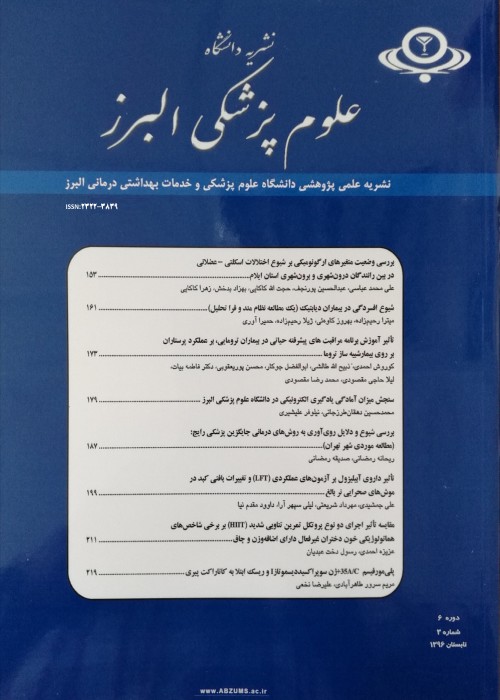Therapeutic Effect of N-acetylcysteine on Changes in Liver Enzymes and Tissue Damage in Male Wistar Rats Exposed to Acute and Chronic Doses of Dadmium
Cadmium is a toxic heavy metal found in environmental pollutants in metropolitan areas that enters the body via inhalation and causes the production of reactive oxygen species, apoptosis, and changes in protein structure. The purpose of this study was to see how N-acetyl cysteine (due to its sulfhydryl group and purification of reactive oxygen species) affected liver enzymes and inflammation in rats exposed to acute and chronic cadmium chloride doses.
In this study, 30 two-month-old male Wistar rats were randomly divided into 5 groups of 6. The control group (G1) was fed only standard water and food and the first treatment group (G2) received 80 mg / kg cadmium chloride on the first day of the study. The second treatment group (G3) received 2.5 mg / kg cadmium chloride daily for four weeks. The third treatment group (G4) received 80 mg / kg cadmium chloride along with 50 mg / kg n-acetyl cysteine on the first day of the study. The fourth treatment group (G5) received 2.5 mg / kg cadmium chloride and 50 mg / kg N-acetyl cysteine daily for four weeks. At the end of the treatment period, after anesthesia, blood samples were taken from the hearts of rats to measure the level of liver enzymes. Then their liver was removed and histopathological tests were performed.
Treatment with cadmium chloride in continuous dose caused a significant increase in the levels of ALT, AST, ALP and LDH enzymes compared to the control group. There was no significant change in GGT enzyme level. Cadmium chloride caused inflammation around the arteries and increased the thickness of the hepatic arteries. After treatment with N-acetyl cysteine in the fourth treatment group (G5), the level of enzymes compared to the second treatment group (G3) showed a significant decrease. Inflammation around the arteries and the thickness of the arteries were also reduced compared to G3.
Continuous N-acetyl cysteine administration reduces cadmium chloride toxicity in rats exposed to a continuous dose of cadmium chloride by lowering serum levels of ALT, AST, ALP, and LDH enzymes, as well as hepatitis.
- حق عضویت دریافتی صرف حمایت از نشریات عضو و نگهداری، تکمیل و توسعه مگیران میشود.
- پرداخت حق اشتراک و دانلود مقالات اجازه بازنشر آن در سایر رسانههای چاپی و دیجیتال را به کاربر نمیدهد.


